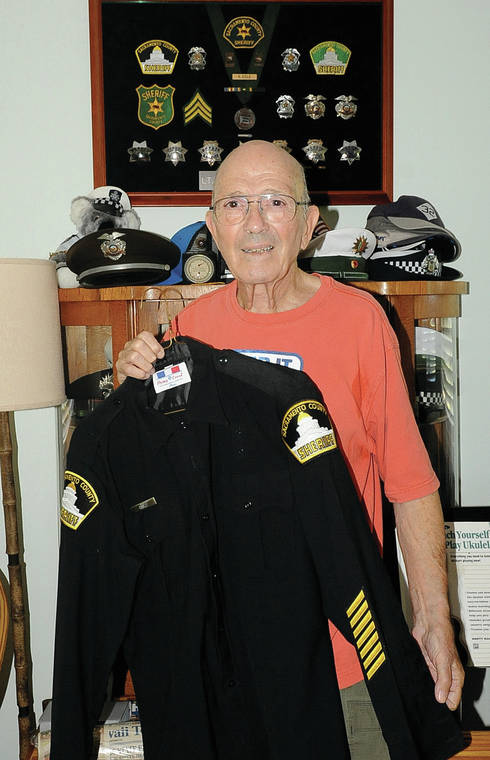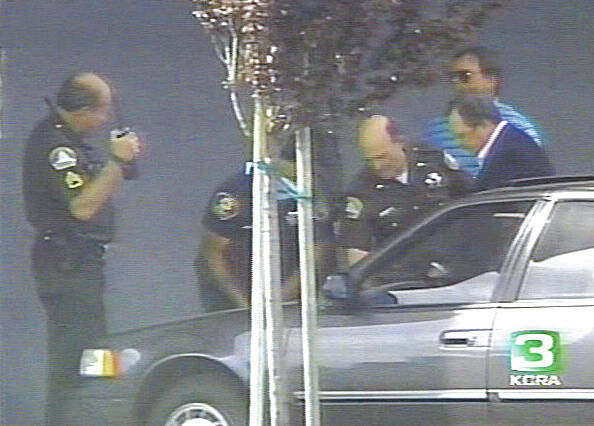Fateful day forever recounted: Kona resident helped lead country’s largest hostage rescue


KAILUA-KONA Ronald Cole, 83, remembers details of that fateful day as if it just happened.
KAILUA-KONA — Ronald Cole, 83, remembers details of that fateful day as if it just happened.
A Korean War veteran, Cole vividly recalls when the call came in — shots fired at the Good Guys electronics store.
ADVERTISING
“I was just up the street checking activity, dope, prostitution and the like. Everything was dead, which was unusual for that area,” said Cole, a Kona resident and retired Sacramento County Sheriff lieutenant about that April 4, 1991, day in California, when the largest hostage situation in U.S. history went down and Cole was to lead the rescue operation.
“I’m really bored and I leaned over to my computer and typed in, ‘It’s really quiet out here.’ I pushed the button and the dispatcher looks at it and at the same time this computer starts to scream, ‘Armed robbery in progress, shots fired.’”
Cole raced to the store where he was one of the first officers at the scene.
He set up a command post, and took the role of field commander, but wasn’t sure what was happening since no one was coming out of the store, which was unusual for a robbery. He had no information about how many hostages or gunmen were in there. A radio sergeant made contact with them and established the gunmen were Vietnamese.
The harrowing experience was featured on a recently aired television documentary.
Investigation Discovery Channel interviewed Cole and two hostage survivors, inserted actual footage and recreations for their series “Shattered.”
Cole didn’t need to re-watch footage or peruse old news clips to wrestle the memory free. He remembers precisely when the gunmen tied the hostages together with speaker wire and lined them up in front of the store window as human shields.
Cole’s alarms sounded all the more — it was a tactic used in the Korean War when the North Koreans were about to shoot their victims.
Their first demand was for a bulletproof vest. Cole kept an old vest in the trunk of his squad car, which was on the department’s “do not use this vest” list.
“Tell them I want hostages for the vest,” Cole told them.
A deal was reached. They agreed to release a woman and two children for the old vest.
Stripped down to his underwear as to prove he was not carrying a gun, an officer delivered the vest to the assailants.
The gunmen tested the vest with a shotgun, but they were using birdshot so it bounced off, leading them to believe the vest would help save them. One of the gunmen wore the vest during the entire ordeal.
With one hostage released, the team was able to gain insight as to what was happening inside.
There were approximately 40 hostages and four gunmen.
Cole called in the hostage negotiation and SWAT team, whose captain wanted to take over the operation.
“You take over when we let you take over, when I say ‘green light,’” Cole told them.
Another officer came and wanted to take over the operation from Cole. The officer called the undersheriff to get Cole relieved of command.
“The undersheriff asked him, ‘How many of these have you done?’ and the guy said, ‘Well, I haven’t done any but I’ve gone to all the schools,” Cole recalled.
The undersheriff told him that Cole had done over 60 of these types of situations and never lost a hostage.
“He told him to keep his nose out of there and stay out of his way.”
Cole remained in charge of the situation.
He put a team on the roof and had SWAT stand-by in an adjacent store where they could breach a wall into the Good Guys store when the go-ahead was given.
He also had to handle the press that had converged on the site, filming and broadcasting everything live through the store’s front windows.
“By now people are calling saying, ‘I don’t know where Uncle Joe is,’ because they saw it on TV, so we put them down as a possible hostage,” Cole recalled.
They started running the license plates in the parking lot. They knew the suspects were Vietnamese and found a car registered to a Vietnamese couple. When detectives went to talk to them they realized the gunmen were the couple’s three sons and a friend.
“They were brought to the scene but the boys didn’t want to talk to their parents,” said Cole.
But now they knew who they were.
The gunmen, ages 17-21, who came to the U.S. as young children, did not know what they wanted and continuously changed their demands. First they wanted 1,000-year-old ginseng tea, then they wanted to see the president, then the governor.
They kept negotiating with the gunmen whose demands included keeping their guns in prison if they surrendered, a helicopter and safe passage to Vietnam. Of course, none of the demands could be met.
It was at that time that the youngest hostage taker started going nuts, and the oldest one started losing control. The younger one started saying, “We got to shoot somebody.”
“We knew that when they start shooting the hostages we’re going to have to move. We can’t just sit there and let them shoot,” he said. So he had two snipers positioned by the front door, because he knew the bullet would fail on the first shot, deflected by the glass.
Cole said he knew the gunmen had two 9mm and a .45 Star pistol and a shotgun because they had records of them purchasing the firearms just days earlier.
As the situation deteriorated, the gunmen shot one of the hostages in the leg and then let him go to show the police that they meant business.
“That changed the whole ball game,” said Cole.
They shot another hostage in the leg. That is when Cole gave the “condition green light SWAT only” order, which meant the two snipers and SWAT team were to take any available shot.
The hostage takers wanted another bullet proof vest. Cole obliged, after taking a few panels out of the vest. A female hostage, who was tethered to the gunmen and whose hands were tied behind her back was sent out to retrieve it. As the door opened, the sniper fired at one of the gunman, but at the same time the door closed. The bullet shattered the glass door, was deflected and grazed the side of the gunman’s head.
“You could hear him screaming in there, then he started running down the line, shooting hostages. He turned, screaming, running out of sight and ran right into the SWAT team who breached the wall from the adjacent store.”
They killed him and two more of the gunmen.
Another SWAT officer shot the gunman wearing Cole’s vest. He survived, but lost his lung.
“He jumped in with the hostages when SWAT was shooting, screaming that he was a hostage,” said Cole. The hostages were quick to dispel that statement.
In the end, the gunmen had killed three hostages and wounded 11.
After eight and a half hours, it was all over and the scene was secured.
Cole said he went back to the command post and tried to forget about it, but it still bothers him to this day.
Cole said the documentary was fairly accurate, but didn’t give enough credit to the other officers.
“They did all the work, I did the masterminding and ran a lot of interference,” he said.
Cole said there are plans to make a feature film, with Michael Keaton playing him.
Production is slated to start in June in Romania, and Cole has been asked to go as an expert consultant.
The season 3 episode 8 “Shattered” documentary titled “The Green Light” can be viewed on the Investigation Discovery Channel website.


